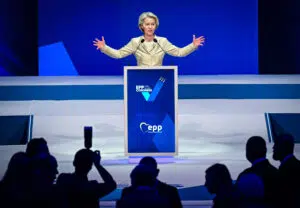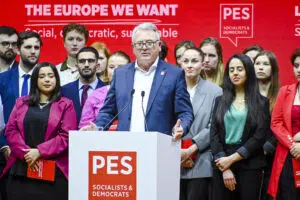Brussels – Following the political shock of the first farewell— by the United Kingdom—these may be the last European elections including 27 countries and the ones that precede a new EU enlargement. Although it will not be the very first topic on the political agendas in the run-up to the vote of June 6-9 for the renewal of the European Parliament, the way in which the enlargement of the Union to new potential members has been linked to the internal reform of the EU institutions has undoubtedly guaranteed a significant space in the agendas of the European political families (except Identity and Democracy, which has chosen not to adopt a common one for the member parties). No one is opposed to an increase in the number of member countries anymore because each capital and each European party has its interests and goals. Still, the stages and ways of managing a very political and technical process can differ significantly.
The EPP and the “intermediate measures”
“Every candidate country must be ready for accession; in the meantime, we should take intermediate measures and closer cooperation to put candidates in the best position to join.” This is the heart of the European People’s Party’s (EPP) position regarding keeping the “EU’s accession promises and a forward-looking enlargement strategy” for the six Western Balkan countries (Albania, Bosnia and Herzegovina, Kosovo, North Macedonia, Montenegro and Serbia), Ukraine, Moldova, and Georgia. As it emerges from the Manifesto for the 2024 European elections, the EPP does not discount the fact that “all candidate countries shall be bound by the same rules on the path to full membership,” and although “we do not want an endless process,” the Copenhagen criteria that enshrine the foundational basis for EU membership “must be clearly met” for any EU enlargement process.

Treaty reform and its link to future EU enlargement find no place in the European People’s Party program. Still, the reference to “respect for good neighbourly relations with all EU member states” shows between the lines how sensitive the EPP is to some of the demands of national parties that join the centre-right European political family (as in the case of the Greeks of New Democracy with Albania and with North Macedonia, and the Bulgarians of Gerb again with Macedonian neighbours). “Any decision must be based on concrete results provided by the candidate countries,” after assessments of “minimum prerequisites for any state aspiring to join the EU,” including respect for the rule of law, democratic institutions, and human rights. As for the delicate chapter on Turkey—whose negotiations have been frozen since 2018—the EPP, for the time being, “excludes the possibility of an accession” of Ankara to the Union but pushes for an “improvement of the existing customs union and visa facilitation” to “pave the way for its European vocation.”
The PES between “effective” enlargement and EU architecture
The Manifesto of the Party of European Socialism (PES) for the 2024 European elections highlights how EU enlargement has been in Europe’s recent history “a success story, bringing democracy, prosperity and security” to the continent. That is why the start of accession negotiations with Ukraine, Moldova, and Bosnia and Herzegovina are seen favourably, “and we support Georgia’s European aspirations” (despite the recent challenges posed by its government). Contrary to the EPP, Turkey gets no discount: “In the absence of a drastic change of course, the accession process cannot be resumed in the current circumstances.”

The European Socialists speak of implementing an “effective” EU enlargement policy, with the starting point in the Western Balkans, but still “insisting that all candidate countries meet all accession criteria.” It is here, however, that the parallel issue to EU enlargement of “serious assessment of the reforms of the architecture of the EU”—considered “necessary” for a Europe that is “more efficient and democratic, more transparent and closer to its citizens”—comes into play. With this in mind, the PES promises to “use the next legislative term to strengthen the EU’s capacity to act in an enlarged Union, with targeted Treaty changes.” Although the proposal remains somewhat vague, within this framework the idea is to equip the EU Parliament and Commission with “tools to safeguard our democracy, strengthen our economy, protect our environment and our social model.”
Renew Europe to “reopen the Treaties”
In the ten priorities of Renew Europe, we read the closest interconnection between EU enlargement and reform of the Union’s founding treaties. “The more, the mightier. But the governance of an entire continent is not a trivial matter, it is time to reopen the Treaties,” is the appeal ahead of the June European elections, accompanied by a specific warning: “Without deep reforms, enlargement risks turning into a failure for all.” On the entry of new members, the European liberals focus mainly on Ukraine—which “must and will join”—and on the fact that all those who meet the Copenhagen criteria “should join the Schengen free movement area without further delay.” But the twenty-seven countries must “be able to accommodate it, as well as the other candidates” on the basis of intensive internal work.

The stated goal is that EU treaty reform “needs to happen, and needs happen now, through a series of proposals for greater European integration. First and foremost, an increase in the “efficiency, transparency, and accountability” of the Union’s institutions—”the meetings where national ministers meet are too opaque”—but also the transformation of the Commission “into a proper democratic government, with only one president at the helm of the EU executive,” strengthening the role of the European Parliament “so that the voice of the people resonates even stronger than today,” and above all “we want to get rid of the vetoes” that hold hostage common decisions in Brussels.
The Greens and the fulfilment of promises
“The Necessary Next Step: A United Europe Ready for Enlargement” is the title of the European Green Party‘s Manifesto chapter for the 2024 European elections about the present and future Union, which leaves no room for doubt about the need to “reform its Treaties and move toward a federal Europe able to act and welcome new members.” The starting point is the 2019 Conference on the Future of Europe, where citizens of the 27 member states “gave a clear message that they support new treaties giving the EU greater competences,” but also the desire of “many people in the European neighbourhood to become citizens” of a political project that is “a promise of peace, justice, shared values and prosperity.” From this should come“a new push” for EU enlargement, “long overdue” and with geopolitical implications, primarily because it helps make “borders less important” and is therefore “the best prospect for lasting peace and security in Europe.”

With this short- and long-term vision, “all European countries who strive to be part of or re-join the EU“—a clear message of openness to UK citizens—”and who share our values must be welcomed,” receiving from Brussels “all the support necessary to fulfil the criteria.” For the European Greens, it is a matter of “keeping the promises” made to the candidate countries (but Turkey is not mentioned), with a special emphasis on “support for Kosovo efforts to become a candidate for EU membership” and that “each candidate country should be able to follow its own path to the EU independently of the progress of the other candidate countries” (speaking of Albania and Northern Macedonia, and Kosovo e Serbia). It is also remarked that Ukraine’s future lies in the European Union, and the European Greens are committed to “support the Ukrainian authorities in introducing the necessary reforms.” To do all this, the EU institutions should “work more closely with civil society,” but above all “overcome the unanimity in the Council that is currently hindering accession.” Because, ultimately, “welcoming new members must serve as a vital push for internal reforms,” ensuring that member states can make decisions “efficiently and effectively.”
ECR against EU enlargement as an increase in integration
Brief but incisive paragraph on EU enlargement in the Manifesto of the European Conservative and Reformist Party (ECR) ahead of the June European elections: “It is crucial that the EU does not exploit this opportunity to expand its powers.” Although the European Conservatives say they are willing to “consider further EU enlargement to strategically important countries” (on the basis of merit and compliance with the Copenhagen criteria), they make it clear that “we will categorically reject any automatic deepening of EU political integration as a direct result of enlargement“. Door closed to a reform of the EU Treaties, no exceptions.
The Left and Democratic Safeguards

The Manifesto of the European Left Party also focuses on the priorities of EU enlargement, without mentioning any reform of the Treaties or greater European integration but focusing on the “clear criteria that must not be watered down” in this sphere: “States can only become members of the EU if they respect human rights, the rule of law, and the social and political rights of their populations, including minorities.” In this sense, EU enlargement policy “must not be an instrument for deepening rifts within Europe and increasing military tensions,” nor should it “assign the acceding countries the role of suppliers of cheap raw materials, agricultural products and cheap labour, as it is doing already now.” The Left’s exhortation is to “focus on safeguarding democracy and the rule of law” and, in parallel, on “boosting social cohesion in candidate and member states.”
Find more insights on the Balkan region in the newsletter BarBalcani hosted by Eunews
English version by the Translation Service of Withub










